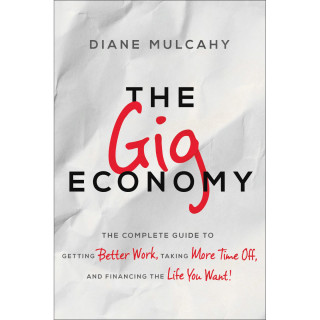3 Exercises to Help Regret-Proof Your Life
Diane Mulcahy, the author of The Gig Economy, shares the simple thought experiments that will help you live more honestly—and make better, bolder decisions.

Photo: Guido Mieth/Getty Images
Hindsight is a useful tool for reflecting on our life choices and how we might make them differently going forward. The Harvard Study of Adult Development, started 75 years ago, has been following a group of 724 men throughout their lives. The study uses hindsight to help us understand what has mattered over the course of its subjects' lives. Its biggest finding was:
In the end, money and career success didn't correlate to greater happiness or meaning—only relationships mattered. With similar results, hospice nurse Bronnie Ware summarized the regrets she heard most frequently from people at the ends of their lives. She found that people were most disappointed about their failure to prioritize internal priorities over external markers of success: "I wish I'd had the courage to live a life that was true to myself, not what others expected of me" was the most common regret.
If only we had the foresight of our hindsight, we could make better decisions. In the absence of that, these three thought experiments attempt to harness the power of hindsight to home in on our internal vision of success.
Step 1: The Obituary Exercise
The traditional obituary exercise asks you to write down the obituary you would like to see written about yourself when you die; it's meant to be an aspirational review of the life you would like to have lived. The following obituary exercise is similar, but it asks you to write two obituaries: one that reflects the life you're leading and one that reflects the life you aspire to lead.
Roz Savage, author of the book Rowing the Atlantic, was a 33-year-old management consultant in London when she sat down and wrote the two versions of her obituary. She reflects on the impact it had on her life:
Roz decided to go live the obituary she wanted to have. She sold her house, left her job, and started a new life. She is now an author, speaker, and environmental activist and has rowed solo across the Atlantic, Pacific, and Indian oceans.
Step 2: The Dash Exercise
This is a twist on the obituary exercise based on the poem "The Dash" by Linda Ellis. The title refers to the dash between the date that you're born and the date that you die.
"For it matters not, how much we own,
the cars...the house...the cash.
What matters is how we live and love
and how we spend our dash."
Take the challenge of the poem to consider: How do I want to spend my dash?
Step 3: The Virtues Exercise
David Brooks, in his New York Times article "The Moral Bucket List," notes that American society spends more time teaching and rewarding us to develop our résumé virtues than our eulogy virtues. "The résumé virtues are the skills you bring to the marketplace. The eulogy virtues are the ones that are talked about at your funeral—whether you were kind, brave, honest or faithful. Were you capable of deep love?" For this exercise, reflect on:
Defining our vision of success is not a one-time exercise. It's one we should revisit routinely throughout our lives. We're usually in our teens and early 20s when our first vision of our adult life starts to form. It's then that we start building a life around what success looks like and map out a plan for our future: Law school! A 10-year slog to partner at the firm! A big house! A family and a dog! Then, 20 years later, we've made partner, hold the title and the degree, and live in a five-bedroom house with our family and the requisite dog but feel dissatisfied, unhappy, and unfulfilled. "Is this all there is?" we wonder. We're in our 40s and on the verge of a midlife crisis because we're living with decisions we made two decades ago, when we had different values and experiences to draw upon. We never stopped along the way to check in, reflect, reconsider our choices, and make changes to our vision.
 This is an excerpt from The Gig Economy by Diane Mulcahy, published by AMACOM.
This is an excerpt from The Gig Economy by Diane Mulcahy, published by AMACOM.
Diane Mulcahy is an adjunct lecturer at Babson College, where she created and teaches "The Gig Economy," a popular MBA course that Forbes.com named one of the top-ten most innovative business school classes in the country. She is also a senior fellow at the Ewing Marion Kauffman Foundation. Her work in venture capital and entrepreneurship has been featured on NPR and in The Economist, Forbes, Fortune, the Harvard Business Review, The Huffington Post, The New Yorker, and other national media. Diane is also a frequent speaker at conferences and universities worldwide. Diane holds A.B. and M.P.P. degrees from Harvard University.
Want more stories like this delivered to your inbox? Sign up for the Oprah.com Money Newsletter!
...many of our men, when they were starting out as young adults really believed that fame and wealth and high achievement were what they needed to go after to have a good life. But over and over, over these 75 years, our study has shown that the people who fared the best were the people who leaned in to relationships, with family, with friends, with community.
In the end, money and career success didn't correlate to greater happiness or meaning—only relationships mattered. With similar results, hospice nurse Bronnie Ware summarized the regrets she heard most frequently from people at the ends of their lives. She found that people were most disappointed about their failure to prioritize internal priorities over external markers of success: "I wish I'd had the courage to live a life that was true to myself, not what others expected of me" was the most common regret.
If only we had the foresight of our hindsight, we could make better decisions. In the absence of that, these three thought experiments attempt to harness the power of hindsight to home in on our internal vision of success.
Refine Your Vision of Success
Step 1: The Obituary Exercise
The traditional obituary exercise asks you to write down the obituary you would like to see written about yourself when you die; it's meant to be an aspirational review of the life you would like to have lived. The following obituary exercise is similar, but it asks you to write two obituaries: one that reflects the life you're leading and one that reflects the life you aspire to lead.
Roz Savage, author of the book Rowing the Atlantic, was a 33-year-old management consultant in London when she sat down and wrote the two versions of her obituary. She reflects on the impact it had on her life:
The first was the life that I wanted to have. I thought of the obituaries that I enjoyed reading, the people that I admired...the people [who] really knew how to live. The second version was the obituary that I was heading for—a conventional, ordinary life—pleasant and with its moments of excitement, but always within the safe confines of normality. The difference between the two was startling. Clearly something was going to have to change...I needed a project. And so I decided to row the Atlantic.
Roz decided to go live the obituary she wanted to have. She sold her house, left her job, and started a new life. She is now an author, speaker, and environmental activist and has rowed solo across the Atlantic, Pacific, and Indian oceans.
Step 2: The Dash Exercise
This is a twist on the obituary exercise based on the poem "The Dash" by Linda Ellis. The title refers to the dash between the date that you're born and the date that you die.
"For it matters not, how much we own,
the cars...the house...the cash.
What matters is how we live and love
and how we spend our dash."
Take the challenge of the poem to consider: How do I want to spend my dash?
Step 3: The Virtues Exercise
David Brooks, in his New York Times article "The Moral Bucket List," notes that American society spends more time teaching and rewarding us to develop our résumé virtues than our eulogy virtues. "The résumé virtues are the skills you bring to the marketplace. The eulogy virtues are the ones that are talked about at your funeral—whether you were kind, brave, honest or faithful. Were you capable of deep love?" For this exercise, reflect on:
- What virtues do I spend most time developing in my life and why?
- What eulogy virtues would I like to cultivate?
Defining our vision of success is not a one-time exercise. It's one we should revisit routinely throughout our lives. We're usually in our teens and early 20s when our first vision of our adult life starts to form. It's then that we start building a life around what success looks like and map out a plan for our future: Law school! A 10-year slog to partner at the firm! A big house! A family and a dog! Then, 20 years later, we've made partner, hold the title and the degree, and live in a five-bedroom house with our family and the requisite dog but feel dissatisfied, unhappy, and unfulfilled. "Is this all there is?" we wonder. We're in our 40s and on the verge of a midlife crisis because we're living with decisions we made two decades ago, when we had different values and experiences to draw upon. We never stopped along the way to check in, reflect, reconsider our choices, and make changes to our vision.
 This is an excerpt from The Gig Economy by Diane Mulcahy, published by AMACOM.
This is an excerpt from The Gig Economy by Diane Mulcahy, published by AMACOM.
Diane Mulcahy is an adjunct lecturer at Babson College, where she created and teaches "The Gig Economy," a popular MBA course that Forbes.com named one of the top-ten most innovative business school classes in the country. She is also a senior fellow at the Ewing Marion Kauffman Foundation. Her work in venture capital and entrepreneurship has been featured on NPR and in The Economist, Forbes, Fortune, the Harvard Business Review, The Huffington Post, The New Yorker, and other national media. Diane is also a frequent speaker at conferences and universities worldwide. Diane holds A.B. and M.P.P. degrees from Harvard University.
Want more stories like this delivered to your inbox? Sign up for the Oprah.com Money Newsletter!



